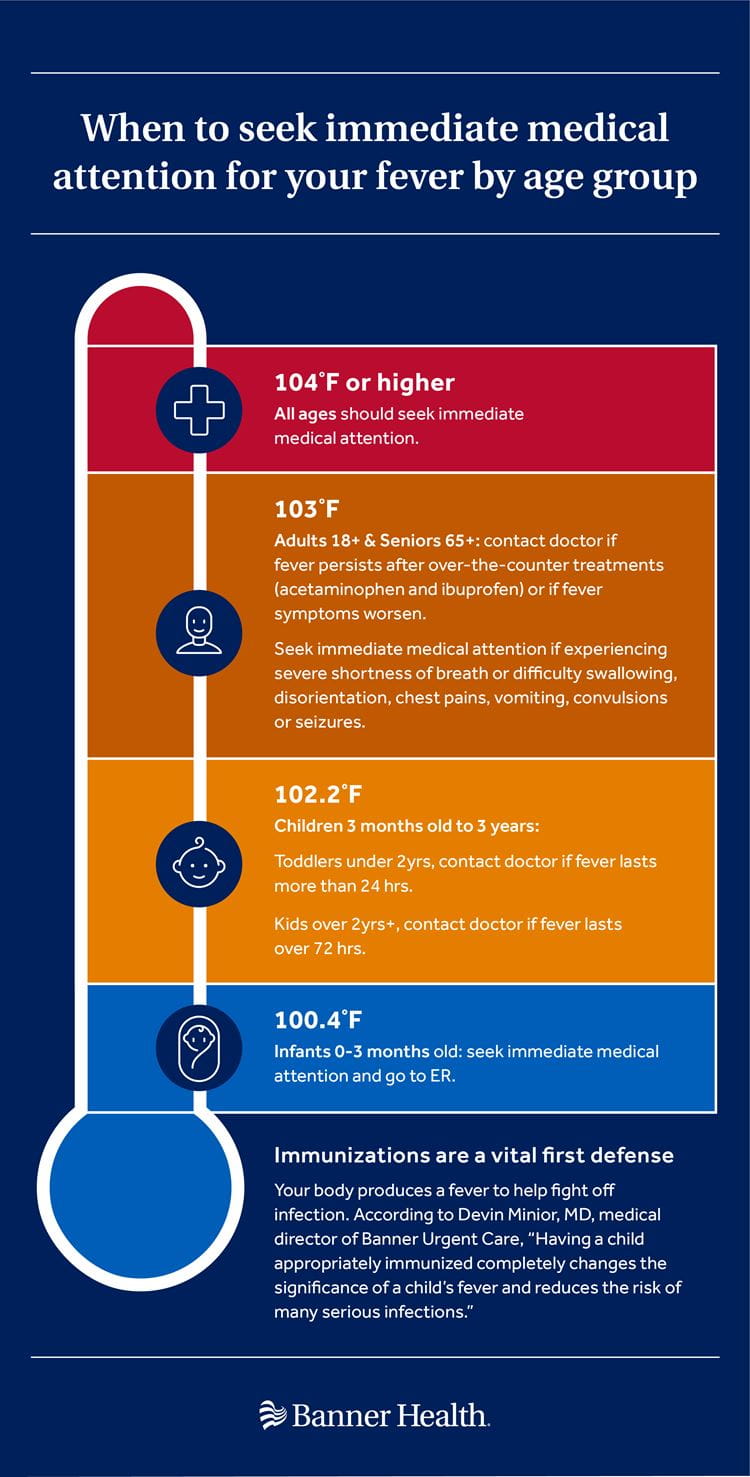You’ve got chills, and they’re multiplying. And now your muscles ache and your body feels warm too. Uh oh. Looks like you may have a fever. Should you be concerned?
Although a fever could be worrisome, it’s not always serious. In general, fevers mean your body is fighting off an infection or illness. But things like exercise, hot weather, immunizations and even pregnancy can at times make you run warmer than normal.
The question will inevitably arise, however, when you’ll wonder if your fever should be concerning. We asked Devin Minior, MD, medical director of Banner Urgent Care, to provide some insight and recommendations for fevers at every age.
Newborns and children
Occasional infections and fevers are inevitable, even in babies and children. But when they seem dehydrated and irritable, you may wonder what to do.
Babies and children whose temperatures are lower than 102 degrees Fahrenheit (F) often don’t need medicine unless they are in pain or uncomfortable. Usually you can help ease their symptoms with medicines, rest and drinking plenty of fluids.
When it comes to medications, you can give acetaminophen or ibuprofen based on the instructions on the medicine’s packaging. Never give aspirin to your child due to its association with Reye’s syndrome, a rare life-threatening disease. Infants under three months old should not be given any medicine for fever without first checking with your doctor.
When to seek help
You should seek medical attention for a child under the following fever scenarios:
- If 3 months old or younger and has a fever of 100.4 degrees F or higher
- If 3 months to 3 years old and has a fever of 102.2 degrees F or higher
- If 2 years old or younger and has a fever that lasts longer than 24 hours
- If older than 2 years old and has a fever that lasts longer than 72 hours
- If your child has a fever along with other symptoms, such as ear pain, sore throat or a stiff neck
- If your child has a febrile seizure
- If your child is not acting themselves, appears ill, or becomes listless or unresponsive
- If you are concerned
Immunizations are a vital first defense
Your body produces a fever to help fight off infection. “Having a child appropriately immunized completely changes the significance of a child’s fever and reduces the risk of many serious infections,” Dr. Minior said. Immunizations help eliminate the cause and severity of fevers before they even happen. Meet with a physician to make a plan for your child’s immunizations and protect them from known dangers. Are you missing your own immunizations? This guide will tell you which immunizations you need and how often they need to be boosted.
Adults: Ages 18 to 65
No treatment is necessary for a mild fever unless you are uncomfortable. The same comfort measures apply as with children, such as taking over-the-counter medications like acetaminophen or ibuprofen, drinking plenty of fluids and getting plenty of rest.
When to seek help:
- If your temperature is 103 degrees or higher
- If the fever symptoms worsen or do not improve with treatment
Seek emergency medical attention if you are having difficulty breathing or swallowing, severe abdominal or chest pains, are agitated or confused or if you have a weakened immune system (those with cancer or AIDS).
Older adults: Ages 65 and older
Seniors typically have a lower body temperature and may run a bit cooler than young adults, so make sure you have a baseline reading of what your typical temperature should be. If you are running a low fever, the same comfort measures apply, such as taking acetaminophen and ibuprofen if you are uncomfortable, getting plenty of rest and plenty of fluids.
When to seek help
Due to other medical conditions and age, older adults can be more significantly impacted by bacterial and viral infections. You should seek immediate medical help if the fever is higher than 103 degrees F, if you are not able to perform the typical activities of daily living, or if you develop associated symptoms such as headache, severe shortness of breath, disorientation, chest pains, vomiting, convulsions or seizures.
Fevers during COVID-19
Key symptoms of the COVID-19 pandemic include fever, cough, fatigue, congestion, shortness of breath, and/or sore throat. What makes this illness challenging to diagnose, is that only some of these symptoms may be present at different times during the course of a COVID-19 infection. A low-grade fever of only 100.4 degrees F or above may only be present half of the time for these patients.
Diagnostic procedures and technology are evolving daily. For more on the latest testing guidelines and to learn more about the evolving situation, go to bannerhealth.com.
Need a doctor? To find a Banner Health physician, visit bannerhealth.com or find a Banner Urgent Care near you.



